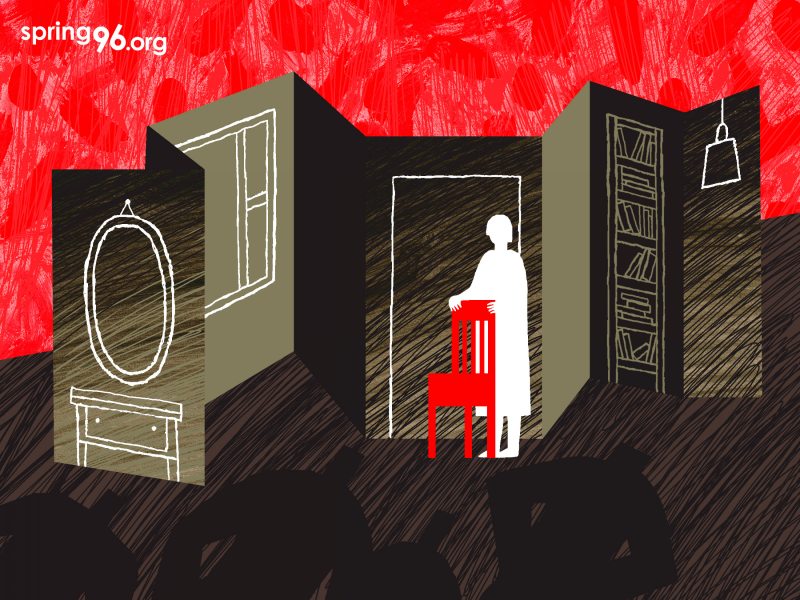Home confinement replaced with penal colonies en masse: the reasons and who it affects
In recent months, in Belarus, those sentenced to restriction of freedom without referral to an open-type correctional facility have their punishment increased and get transfered from home confinement to penal colonies. According to Viasna, starting in June, the courts have already handled or will handle soon at least 15 cases "on the replacement of restriction of freedom" for previously convicted for political reasons. Even those who left Belarus after the verdict are tried. According to the legislation, three penalties for violations are enough to replace the punishment with a stricter one. At the same time, those sentenced to home confinement are constantly put under pressure: they are visited at night with checks, restricted in their leisure time and sentenced to days of detention for "violating the regulations of serving a sentence." Viasna, together with lawyer Vika Rudziankova, explains the reasons for changing the punishment, which kinds of violations are punished, and what is considered malicious evasion from serving a sentence.
"The rights of people in this situation are constantly violated"
The practice of replacing home confinement with imprisonment is not new. However, over the past year, Viasna has noted a notable increase in such cases. In the last three months alone, at least 15 trials "on the replacement of restriction of freedom without referral to an open-type correctional facility" have been held or will be held throughout Belarus. The vast majority of cases are heard in the courts of Minsk. At the same time, it is known that even those who left Belarus after the verdict are tried. For example, on August 21, the Minsk District Court will hold trials to replace home confinement to Vital and Lizaveta Pryneslik, who in May 2023 were sentenced to two years of restriction of freedom for participating in protests in 2020. It is known that the family has left Belarus.
Human rights defenders regularly receive information about the pressure on those sentenced to home confinement.
"In case of violation of the regulations of serving a sentence, punitive measures may be applied against the convicted person, which significantly worsen their situation. These measures range from reprimand to disciplinary isolation and, as a result, even the replacement of restriction of freedom with deprivation of freedom.
The logic of persecution aimed at those sentenced to home confinement is the same as persecution against other political prisoners. The rights of people in this situation are constantly violated, and it is impossible to protect them at the state level. If there is a will to do so, the staff of the penal enforcement inspectorate can significantly worsen the state of a person who is under constant control and whose actions are significantly limited both formally by the verdict and directly by the staff of the penal enforcement inspectorate. The procedure for imposing penalties is regulated by articles 54-56 of the Penal Enforcement Code," says the Viasna lawyer.
What can be a violation of the regulations of serving a sentence?
|
What are the possible penalties?
If the staff of the penal enforcement inspectorate recognizes the convicted person as a malicious violator, the punishment may be replaced by the court by a stricter one, i. e. imprisonment in a penal colony. |
When is a convicted person considered a malicious violator?By analogy with Article 411 of the Criminal Code, if a convicted person has at least three penalties for violations, they may be recognized as a malicious violator. In this case, the convicted person is given an official warning about the replacement of the restriction of freedom with a stricter punishment, including imprisonment. Until the entry into force of a court decision on the replacement of punishment, the convicted person may be detained for up to 30 days with the approval of the prosecutor. If an employee of the penal enforcement inspectorate assessed the actions of a convicted person as malicious evasion from serving a sentence, then they can issue an official warning to them about replacing the punishment with a stricter one. If any other violation is noticed after this warning, then the case may be referred to the court to replace the punishment with a more serious one. |
What is considered malicious evasion of serving a sentence?
|
Who decides to apply punishments and incentives and how?The head of the Penal Enforcement Inspectorate and the Deputy head of the Internal Affairs body is authorized to reprimand and deprive of the right to leave one's house on weekends and holidays. The head of the territorial body of internal affairs, and their deputy in their absence, may also decide on disciplinary isolation for up to 15 days. According to Part 4 of Article 56 of the Penal Enforcement Code, when making a decision on the application of a penalty, the circumstances of the violation, the personality and previous behavior of the convicted person must be taken into account, as well as the severity of the violation must correspond to the punishment. The penalty must be imposed no later than 30 days from the date of the violation. Penalties must be applied no later than 30 days. |
What is the term of imprisonment that remains to be served?The unserved part of the punishment replaced by imprisonment is calculated this way: two days of restriction of freedom are equal to one day of imprisonment (Part 8 of Article 55 of the Criminal Code). |
"The widespread practice of replacing punishment with a stricter one, enshrined in legislation, violates the principle of non bis in idem, which means that no one can be punished twice for the same act. The principle is enshrined in the Criminal Code, as well as in Article 14 of the International Covenant on Civil and Political Rights, which is binding on the Republic of Belarus," concludes the lawyer of Viasna.
The stories of former political prisoners about the conditions of home confinement:

"Shove your rights up your ass," a former political prisoner speaks about the pressure in home confinement

"Not a single person sentenced to home confinement has been let off the hook." Why is home confinement not a ticket to freedom?


















